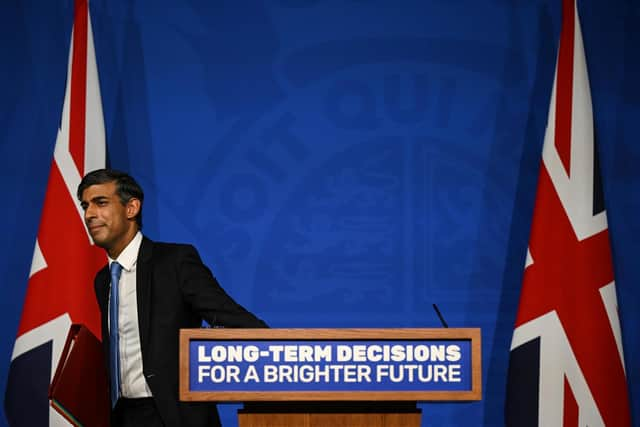The long-standing political consensus on climate change must not end up as collateral damage in a culture war - David Tonge
There is certainly a discussion to be had about fairness, but let us not forget the question of whether it is fair to leave the air our children breathe polluted for longer or to leave more people living in cold, damp houses that are expensive to heat in the absence of a proper national insulation programme.
Unfortunately, while the Prime Minister expressed a great deal of concern about cost, there was no mention in his speech of the Office for Budget Responsibility’s conclusion that not rapidly phasing out fossil fuels would be even more costly as it would keep us exposed to volatile oil and gas prices for even longer.
Advertisement
Hide AdAdvertisement
Hide AdAnd yes, as the Prime Minister remarked, it is important to take people with us, but the answer there is to show leadership, communicate effectively and put the right policies in place – not to slow down our efforts.


Specifically, we welcome the increase in the boiler upgrade grant (although, in our view, rolling out an insulation scheme would be a more effective measure) and understand the need for a more considered approach to the complex issue of decarbonising off-grid homes.
However, we believe the decisions to delay the ban on sales of new petrol and diesel vehicles from 2030 to 2035 and to scrap the requirement on landlords for all rental properties to have an Energy Performance Certificate (EPC) of grade C or higher from 2025 are significant and unnecessary backward steps in our efforts to tackle climate change. The EPC decision will simply push extra heating costs onto tenants.
As financial investors know, past results are not a guarantee of future performance. While the UK has a strong record of decarbonisation in the power sector, progress elsewhere (especially the transport and domestic heating sectors affected by these policy changes) has been slow, and – as the Climate Change Committee highlighted in its June report – we are not on track to meet the legally binding 2030 target of a 68 per cent reduction in UK emissions.
Advertisement
Hide AdAdvertisement
Hide AdIf the government has figures that demonstrate otherwise, we encourage them to share that information.
Finally, we are particularly concerned that these policy changes appear to be part of a wider attempt to frame net zero policy as a ‘wedge issue’ ahead of the next general election.
We urge the Prime Minister not to go down that route and to reach out instead across party boundaries in a spirit of common national purpose. The broad and long-standing political consensus on this crucial issue must not end up as collateral damage in a climate culture war.
We believe the work of reducing our greenhouse gas emissions and restoring Nature so that we can build a prosperous green economy and leave our children a healthy planet is the greatest challenge of our time. Please let us keep it out of the political fray.
Advertisement
Hide AdAdvertisement
Hide AdDavid Tonge is a part of the North Yorkshire Climate Coalition, The coalition is formed by a number of local groups calling for action to tackle climate change. The full list of Coalition members is available at www.nyclimatecoalition.org.